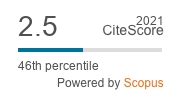Efficient Revocable Multi-Receiver ID-Based Encryption
DOI:
https://doi.org/10.5755/j01.itc.42.2.2244Keywords:
revocation, multi-receiver, ID-based encryption, bilinear pairing, random oracle modelAbstract
Quite recently, Tseng and Tsai proposed a revocable identity (ID)-based encryption (RIBE) with a public channel, in which the private key generator (PKG) can efficiently revoke misbehaving/compromised users by using a public channel. Considering the problem where a sender would like to encrypt an identical message for n receivers, the sender must re-encrypt the message n times using Tseng and Tsai’s RIBE scheme. In such a case, n expensive pairing operations are required for the re-encrypting procedure. In this paper, for reducing the pairing operations, we extend Tseng and Tsai’s RIBE to propose an efficient revocable multi-receiver ID-based encryption (RMIBE) scheme. Our scheme only needs one pairing operation to encrypt an identical message for n receivers while remaining the merit of user revocability in Tseng and Tsai’s RIBE scheme. We demonstrate that the RMIBE scheme is semantically secure against adaptive chosen ciphertext attacks (CCA) in the random oracle model.Downloads
Published
2013-05-31
Issue
Section
Articles
License
Copyright terms are indicated in the Republic of Lithuania Law on Copyright and Related Rights, Articles 4-37.





